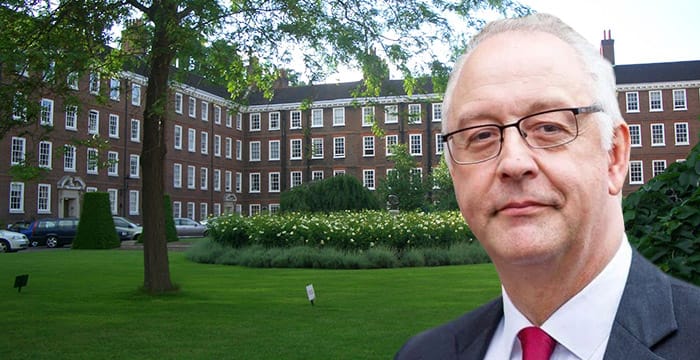Cornerstones Barristers’ Andrew Lane reflects on his career to date and how barrister training should evolve to adequately prepare the next generation of advocates

Public law practitioner Andrew Lane, of Cornerstone Barristers, came to the bar relatively late in life, starting pupillage at 37 years old — “I took my time,” he reflects.
It’s his pre-bar experience in advocacy, campaigning and housing issues, however, that has shaped his current career. His CV is brimming with advice work in the areas of housing, benefits and debt, dating back to his time as a law student at the University of Leicester. In the 1990s, he was a councillor at Oxford City Council, where he chaired the housing committee. He also enjoyed a ten-year stint at Citizens Advice in Oxford, where he was employed to run an advice project.
These days, he has a successful practice acting for local authorities and housing associations, often in judicial reviews. Back then, he was on the other side of the fence, helping tenants bring claims against their local council. While at Citizens Advice, he worked on the duty advice desk, providing advocacy services for tenants in housing possession cases in the county court. “I was sometimes up against barristers in court. Some of them were good, some not so much, and I thought, ‘I’d like to do this’.”
Inconveniently, law degrees go out of date for professional purposes after a certain number of years, so Lane spent two years at Northumbria University, Newcastle, refreshing his law degree and completing a bar training course. He received a grant from Lincoln’s Inn for the first year. Pupillage at Hardwicke chambers followed, in 1999, and he stayed there until 2014, when he moved to his current set at Cornerstone Barristers.
“It was not a traditional route,” he says. Nor does this affable barrister have any lawyers in the family. And he’s not a fan of formal court attire, either. “I used to sometimes do voluntary work assisting people at the social security tribunal in Northampton, and you could appear in jeans, which was great. I’d be quite happy to work in jeans. Wigs can get too hot sometimes. I’m not one for tradition.”
One thing he is passionate about is encouraging talented people from all walks of life to the bar. Currently, the Bar Standards Board (BSB) is rethinking traditional entry routes. In March, its plans to make barristers’ education and training more flexible received the approval of the Legal Services Board (LSB). Potential changes include splitting the Bar Professional Training Course (BPTC) into two stages, and an apprenticeship pathway to qualification.
“My own view is that it is not so much the content of bar training as much as the missing cohort of people who don’t get there in the first place,” says Lane. “I have done mentoring for the bar and have had people tell me, for example, ‘your job isn’t for someone like me’. It’s a real problem that people don’t put themselves forward when they are in fact incredibly talented.”
“There is a wider point about affordability,” he continues. “I’m in favour of more diversity in the widest sense, and I’m not precious about things being done in the same way as they were when I was training. From the barrister’s aspect, we just want quality candidates and I don’t see why a more diverse, flexible way of doing things wouldn’t assist in that regard. While there is no perfect answer, we shouldn’t be standing still. I have been involved with [social mobility and youth empowerment charity] Big Voice London, to help people with non-traditional backgrounds who are interested in the law, and I believe we have an obligation to make entry to the bar as fair as possible. I want people to realise that they can do this job — it is not just for Oxbridge graduates or those from a certain background.”
Lane is also a member of Cornerstone Barrister’s pupillage committee and has served on interview panels at the chambers. What advice does he have for future applicants?
“I am generally blown away by the quality of applicants,” he says. “People can be nervous but we very rarely get someone who completely flunks it — the panel are quite good about putting people at ease.” He says the written part of the application is where people sometimes trip up, particularly where they explain why they want to become a barrister and what areas of law they want to do. For more information on Cornerstone Barristers, future candidates should view the set’s video on applying for pupillage, which can be found here.
Outside of work, Lane is an ardent Manchester United fan. True to the bar’s tradition of impartiality, he gets on well with his head of chambers, an Everton fan, and has supervised a Liverpool-supporting pupil. He is also widely-published in the legal press on his subject area, edits his chambers’ housing newsletter and is the author of the book, Cornerstone on Social Housing Fraud, published by Bloomsbury Professional in 2017. His philosophy is that, above all, you must enjoy what you do. “There is nothing I like better than advocacy, cross-examination, arguing points of law with the judge… it’s fun. It’s like advice work — I enjoy it.” And while he frequently appears in the Court of Appeal, he likes working in the county court just as much. “If you don’t enjoy the work, do something else. It’s important to remember to enjoy it.”
Andrew Lane will be speaking during the future of bar training debate, ‘Education and training at the bar’, at the Future of Legal Education and Training Conference 2019 on Wednesday 22 May at Kings Place London. General release tickets are available to purchase.


